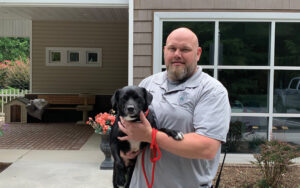
To treat kennel cough, your veterinarian may prescribe weeks of rest, antibiotic therapy and cough suppressants.
Oct. 31. [Update Nov. 3] By TL Bernthal. A respiratory disease spreading among dogs in the community is rising.
One national expert says the uptick in cases starting last year is a result of increased activities of dogs with other dogs as COVID-19 restrictions have relaxed and people resumed life outside the home.
Recent cases of kennel cough in the region have caused some businesses to close or temporarily limit services.
Lucky Dog Bark and Brew sent this email out Oct. 23: “In our ongoing commitment to constant transparency with our amazing Lucky Dog family, we are sending this email out to immediately inform everyone collectively that we are experiencing an outbreak of canine cough here at our Lake Norman facility. As many of you have likely heard, there is a new, stronger strain of canine cough in the region.”
Dog day care, boarding and pet parks, for the most part, require dogs to have bordetella vaccines to participate.
[Update] “For the safety of your pets, Camp Wagging Tails requires that all dogs show proof of current vaccinations records for bordetella (for kennel cough), rabies, and distemper/parvo for all dogs, and requires rabies and FVRCP for all cats,” said Camp Wagging Tails General Manager JR Reiter.
“We recommend your pet receives year-round parasite prevention treatment, including regular deworming and external parasite control, for heartworm, fleas, ticks, and intestinal parasites,” Reiter said in an email. “We love your pets like our own. This ensures a healthy pet and a positive boarding experience for all the animals in our care.”
Cornelius Shelter
The Cornelius Shelter has been spared.

Trey Nodine and Stanley
“Luckily we haven’t had any issues with it” at the Cornelius Animal shelter, says animal control officer Trey Nodine. “However, I have heard that most boarding facilities in the area have struggled with it a bit.”
At the animal shelter, the bordetella vaccine is administered to every dog that comes through the door, Nodine says, and “if they come in already having it, then we booster as soon as needed as indicated by the dog’s veterinary records.”
What is it?
Bordetella is inflammation of your dog’s upper respiratory system, according to the American Kennel Club. This inflammation leads to coughing and illness and can expose your dog to secondary infections.
How’s it spread?
Kennel cough, scientifically known as canine infectious tracheobronchitis, is easily spread from dog to dog through aerosol droplets, direct contact, or contact with contaminated surfaces like food and water bowls, toys, or kennel runs, according to the AKC.
Symptons
The most distinctive symptom of kennel cough is the loud, unmistakable honking cough that dogs develop with the disease. Other symptoms of kennel cough in dogs include a runny nose, sneezing, loss of appetite, lethargy, and a low fever.
Treatment
The disease is usually very treatable. Your veterinarian may prescribe a few weeks of rest for your dog, along with cough medicine and possibly antibiotics to prevent any secondary infections from causing complications, according to the AKC.
[Update] “We have a team of veterinarians in senior leadership roles who oversee our pet and vet healthcare centers,” Dr. Ashley Harris, vice president of veterinary operations for Destination Pet, the parent company of Camp Wagging Tails.
“We have an ever-expanding safety team that monitors our standards and sanitation processes.
“Just like human cold/flu season, this is the time of year for added precaution to ensure the health of our pets. Therefore, we highly recommend additional vaccines, such as Canine Influenza, Lepto & Lyme based on geographic disease patterns,” Harris said in an email.




